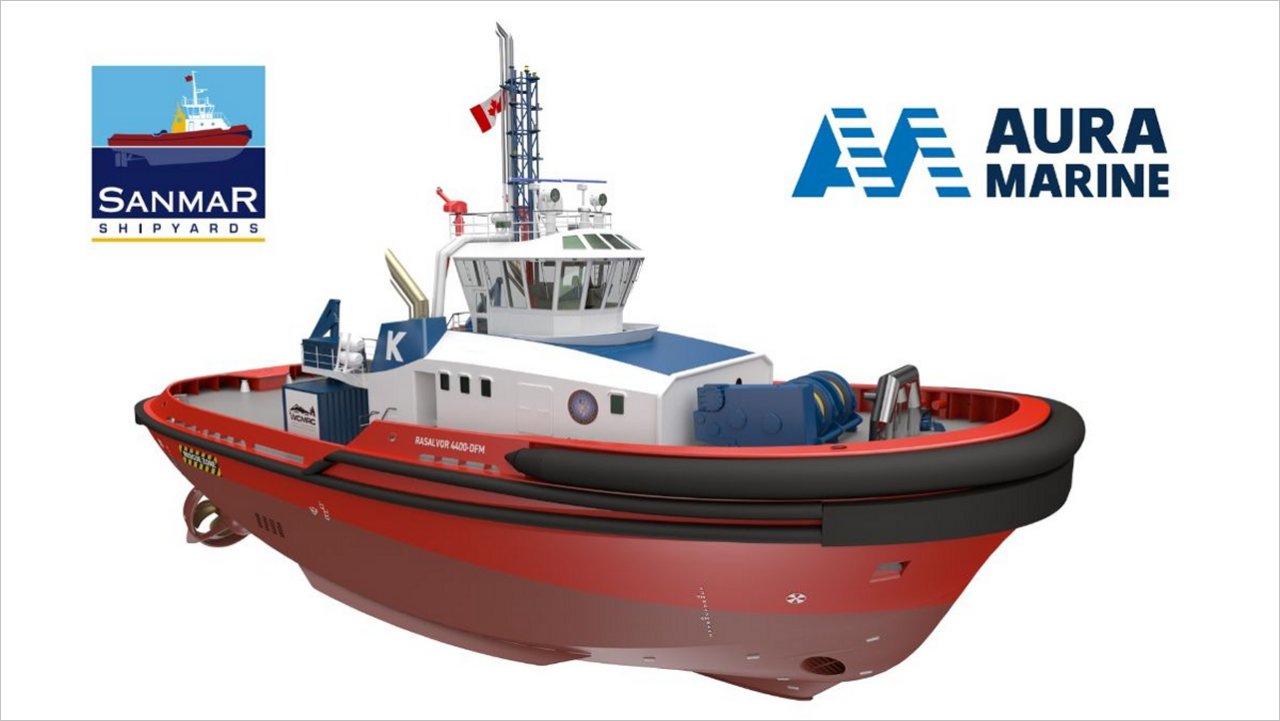
 |
Auramarine's methanol supply system has been selected for the world's first large purpose-built dual-fuel methanol escort tugs.
The two vessels, which are owned by Kotug Canada and measure 44 metres in length, are currently under construction at Sanmar Shipyards Altinova in Yalova, Turkiye, and are due to enter service in mid-2025, making them the first of their kind.
Based on the RAsalvor 4400-DFM design by Robert Allan Ltd., the tugboats will serve Canada's Trans Mountain Expansion Project (TMEP), escorting tankers from the harbour limits of Vancouver to the open Pacific Ocean via the commercial shipping lanes of the Salish Sea.
The landmark vessels — to be named SD Aisemaht and SD Qwii-Aaan'c Sarah in honour of the Sc'ianew First Nation — will also be the most powerful escort tugs in Canada, capable of achieving a massive 120 tonnes of bollard pull; and they are set to provide environmental and ecological benefits through reduced greenhouse gas emissions and underwater radiated noise — designed to help protect the Salish Sea's resident Killer Whales.
Commenting on the partnership with Auramarine, Hakan Tunç, Engineering Director at Sanmar Shipyards, remarked: "This is a great opportunity for both companies to accelerate their decarbonisation journeys, innovate and build something totally new to support the industry going forward."
John Bergman, CEO of Auramarine, said: "We are delighted to be part of this unique project and are committed to supporting our clients on their decarbonisation journey."

|
Ammonia emerges as most feasible alternative fuel for deep-sea shipping in 2050 emissions study
Research combining expert survey and technical analysis ranks ammonia ahead of hydrogen and methanol. |
|
|
|
||

|
EMSA study examines biodiesel blend spill response as shipping adopts alternative fuels
Research addresses knowledge gaps on biodiesel-conventional fuel blends as marine pollutants and response measures. |
|
|
|
||

|
BIMCO adopts ETS clause for bareboat charters, delays biofuel provision
BIMCO’s Documentary Committee has approved an emissions trading compliance clause while requesting further work on a biofuel charter provision. |
|
|
|
||

|
BIMCO and Norwegian Shipbrokers’ Association launch SALEFORM 2025 ship sale contract
Updated agreement addresses banking changes, compliance requirements and environmental regulations affecting vessel transactions. |
|
|
|
||

|
Everllence develops hydrogen test bench for marine engines
German engine maker upgrades Augsburg facility under HydroPoLEn project backed by federal maritime research funding. |
|
|
|
||

|
CMA CGM names 13,000-teu methanol-fuelled containership in South Korea
CMA CGM Osmium to operate on Asia–Mexico service as part of the carrier’s decarbonisation strategy. |
|
|
|
||

|
NorthStandard publishes biofuel guide as marine insurance claims emerge
White paper addresses quality issues and compliance requirements as biofuel testing volumes surge twelvefold. |
|
|
|
||

|
Maritime fuel platform calls for EU shipping ETS revenues to fund clean fuel deployment
Clean Maritime Fuels Platform urges earmarking of national emissions trading revenues for renewable fuel infrastructure. |
|
|
|
||

|
Lloyd’s Register grants approval for hybrid nuclear power design for amphibious vessels
Classification society approves Seatransport’s concept integrating micro modular reactors with diesel-electric systems. |
|
|
|
||

|
Everllence and Vale partner on ethanol-powered marine engine development
Brazilian mining company to develop dual-fuel ethanol engines based on ME-LGI platform. |
|
|
|
||
| Maersk signs green methanol deal with China's Goldwind [News & Insights] |
| World's first methanol-fuelled boxship completes maiden trip [News & Insights] |
| VPS performs first methanol bunker quantity survey [News & Insights] |
| MOL launches Osaka Bay's first LNG-fuelled tugboat [News & Insights] |
| Bunker One launches its first methanol bunker tanker [News & Insights] |